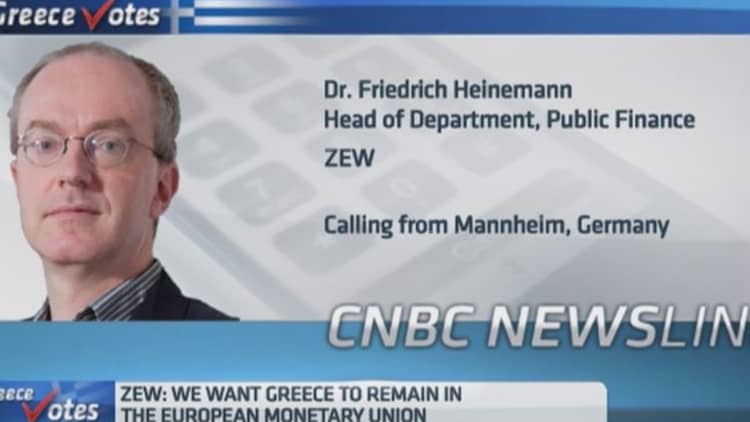
Greece's already-fragile banking sector has taken a hammering as fears of a debt default have hit lender's stocks—and deposits.
Following the victory of anti-austerity Syriza in the polls at the weekend, traders are seriously considering the possibility of a default on Greece's sovereign debt. It's not the first time Greece has defaulted—the first one was around 450 BC and, more recently, private bond-holders were forced to take a haircut on their debt back in 2012. But Greece's banks are ill-prepared for another one.
Shares in the country's four main banks have tumbled since Friday, when polls indicated a victory for Syriza.
Shares of Bank of Piraeus, Alpha Bank, National Bank of Greece and Eurobank all closed more than 25 percent lower on Wednesday.
Read MoreECB now faces another battle: Dealing with Greece
Meanwhile, Greek banks have hemorrhaged deposits since December, when a Syriza victory was seen as increasingly likely. On Wednesday, Citi Bank economists cited estimates suggesting that around 3 billion euros ($3.4 billion) flew out of Greek banks in December, followed by a further 8 billion euros in January.
'A big game is starting'
Syriza's fiery young leader Alexis Tsipras has consistently argued that Greece's sovereign debt burden of 320 billion euros ($364 billion) is unsustainable, and that the country must be offered some form of debt relief—a policy that Germany, among other lenders to Greece, has dismissed.
"Europe and Germany is prepared for accepting the worst case of a Greece default," Friedrich Heinemann, head of the department for public finance at Munich's ZEW research institute, told CNBC on Wednesday.
"A big name is starting now… They are sending out signals of a very tough stance in the upcoming negotiations. But I think it is important that Europe now also sends out a signal that it cannot be blackmailed, because the Greek government, I think it has the expectation that Europe is very anxious to avoid any stopping of payments from the Greek side."
At present, Greece is due to repay 2 billion euros to its lenders in March, of which 1.5 billion euros is owed to the International Monetary Fund.
One option is that Greece and its bailout supervisors could strike a compromise that would see the country continue with its repayments on more sustainable terms. For example, Greece's existing debt could be replaced with longer-term bonds with lower interest rate payments.
However, Alberto Gallo said this method, which has been previously tried, would simply delay the problem.
"We do expect both a soft restructuring of Greek debt and OSI (official sector involvement)," said the economist in a research note on Wednesday.
"We think an OSI haircut of at least 33 percent (to EFSF and bilateral loans) is required to restore sustainability, reducing the debt-to-GDP ratio by 35 percent points."

